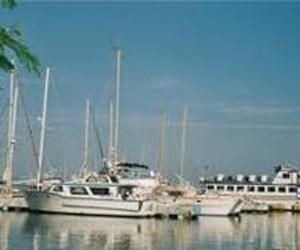Cienfuegos emerging as island of growth amid recession
- Submitted by: manso
- Business and Economy
- 10 / 17 / 2010

Venezuelan-Cuban petrochemical projects worth billions of dollars are materializing around the port city of Cienfuegos, just when recession-stricken Cuba needs it most.
Official media on Tuesday reported that the creation of a “petrochemical hub” at the southern port, including the expansion of a refinery from 65,000 to 150,000 barrels a day, construction of a regasification plant as well as of several petrochemical plants, and the overhaul and expansion of the port are creating 14,500 state jobs. In September, the government announced it is laying off 500,000 state workers. Also, a thermoelectric power plant nearby is going through an update, partly converting it from fuel oil to natural gas.
Thousands of the new employees are currently being trained in high-skill technical careers to operate the new facilities.
Venezuela is funding the projects, but many contractors will be third-country companies. Chinese construction companies, for instance, have landed the biggest contracts so far, for the refinery expansion and construction of other petrochemical plants. However, suppliers from Great Britain, Germany, Italy, Australia and elsewhere are also participating.
As part of the petrochemical hub plans, the port will add three berths and a terminal for supertankers within four years, expanding total capacity by 66 percent. Cienfuegos currently has five berths. Supplying the refinery with Venezuelan crude, supertankers have docked at Cienfuegos since 2008, already making the port the largest in Cuba in terms of tonnage.
The new supertanker terminal will be built at Punta Colorados, and a new berth to handle asphalt, coke and sulphur shipments will be added to the current terminal near the refinery, the local port director said, according to the Cinco de Septiembre newspaper. A berth to handle PVC, ammonium and fertilizer will be added to the Calicito bulk cargo area, which will be updated as well. Finally, construction of a plant that will process liquid natural gas brought in supertankers from Venezuela will also require a new berth. A new port traffic control center will be the “brain” of the port.
The mouth of Cienfuegos Bay, a major bottleneck for supertankers, will require major dredging, as will the turnaround area of Pasacaballo. Tug boats directing supertankers are currently operating at the limits of maneuverability in the straight passage of Jagua.
Cienfuegos is not the only port expansion in Cuba. Construction of a container terminal at the Port of Mariel, just west of Havana, began early this year, with funding from Brazil and Dubai. Mariel will also be the base for offshore oil operations.
Venezuela is also funding construction of a $600 million ferro-nickel processing plant in eastern Cuba, which began last year.
Source: www.cubastandard.com/2010/10/14/
Comments